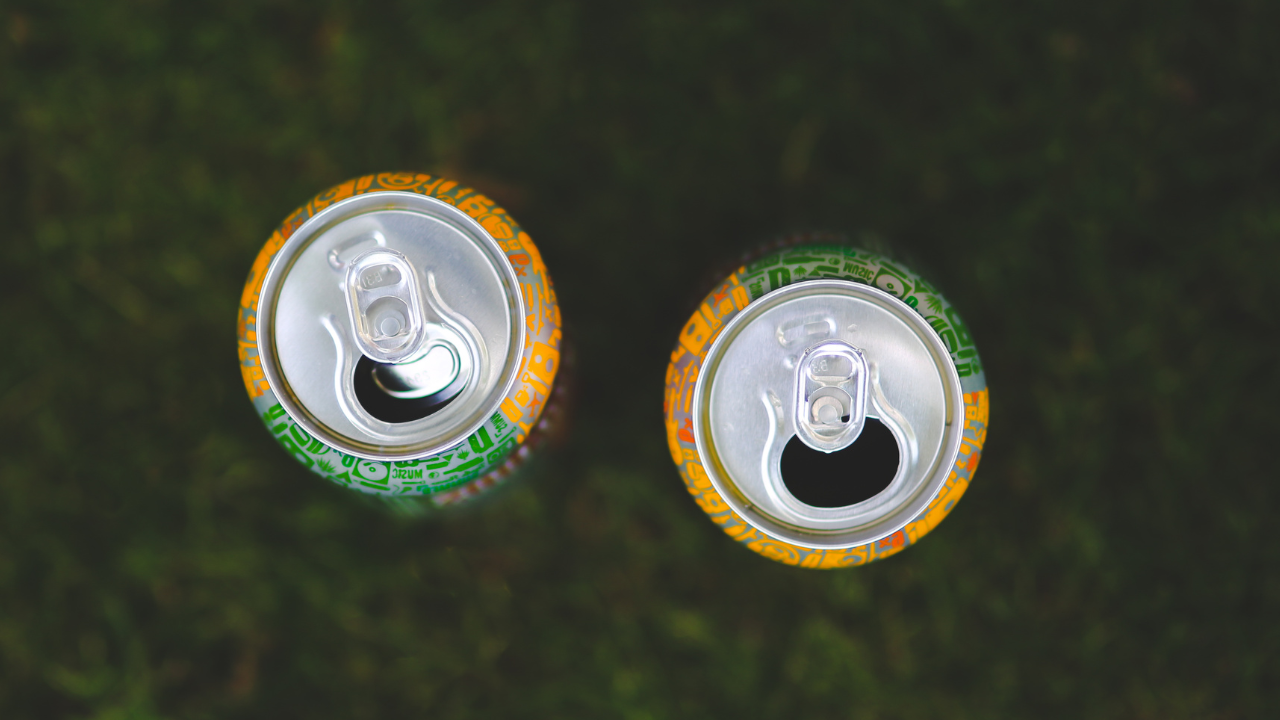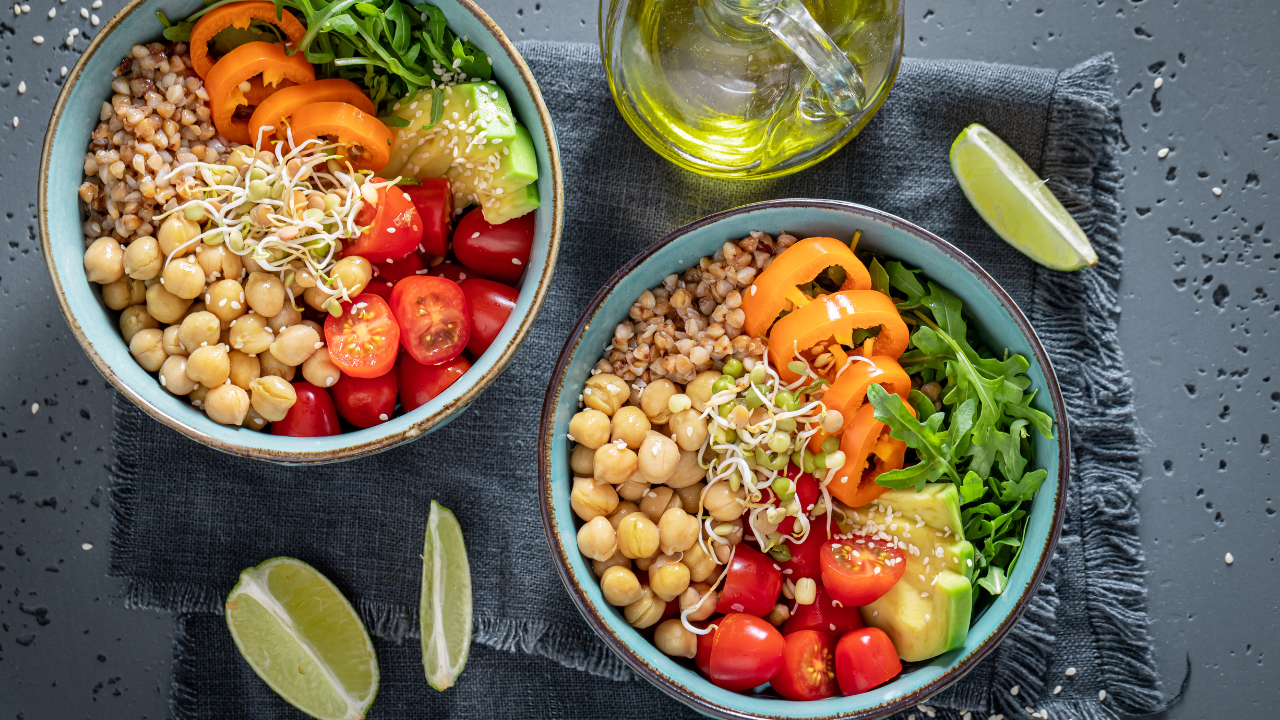Are Seed Oils Toxic? Dietitian Debunks Claims of Health Risk
The internet has a tendency to choose a certain food or ingredient and demonize it for a while, usually as a way to sell something else. Recently, the food of choice has been seed oils.
You’ve likely seen social media posts telling you (usually in the form of unnecessary yelling or scolding) that you should avoid these “industrial lubricants” at all costs because they are inflammatory, full of GMOs, and ultra processed. But how true are these scary claims?
If you’re new here, hello and welcome! My name is Hannah and I am a non-diet dietitian here to help you improve your relationship with your food and finally find food freedom.
Table of contents:
The types of fats
There seems to be a lot of conflicting information out there about the different types of fats. Are animal fats better for you? Are oils really heart-healthy?
Since seed oils are composed largely of fats, let’s do a brief nutrition science lesson so that the remainder of this post will be easier to follow.
Monounsaturated fats
Monounsaturated fatty acids (MUFAs) are known as the “good” or “healthy” fats because they may improve blood cholesterol levels. Olive oil, avocado oil, and canola oil are high in monounsaturated fat.
Polyunsaturated fats
Polyunsaturated fatty acids (PUFAs) are also considered a “healthy" fat and include both omega-3 and omega-6 fatty acids. These are both essential nutrients, meaning that the body cannot make then and they need to be obtained from our diet. Some theorize that diets with a ratio higher of omega-6 fatty acids to omega-3 are inflammatory, but this claim is not supported by research.
Like monounsaturated fats, polyunsaturated fats are liquid at room temperature. Oils high in polyunsaturated fats include sunflower, corn, soybean, and canola (which is higher in monounsaturated fat, but does also contain polyunsaturated fat).
Saturated fats
Saturated fats are known as the “unhealthy” or “bad” fats due to strong evidence correlating saturated fats and cardiovascular disease. But the degree of “unhealthiness” of saturated fats is currently up for debate. Many of the anti-seed-oilers will claim that animal fats like butter (which are largely saturated) are healthier than seed oils. We will debunk this later on in this post, but a little spoiler - evidence suggests that replacing saturated fats with unsaturated fats can lower cholesterol levels.
The types of oils that are high in saturated fat include coconut oil (nope, coconut oil is not as magical as it is claimed to be) and palm oil. But it is important to note that all oils contain some of each type of fat. Olive oil, for example is known to be very heart-healthy and high in monounsaturated fats, and it is, but it does also contain some saturated fat.
This is why there is no use obsessing over the nutrient composition of singular foods. You likely are not eating bowls full of butter or oils and therefor it can be tough to say that any of these types of fats will be a cause of any health conditions. The way that our individual bodies respond to nutrients is also dependent on genetics and various other factors. One way of eating that works for the “carnivore dieter” may not work so well for others. Nutrition is not “one size fits all”.
What are seed oils?
Seed oils are vegetable oils obtained from the seed (endosperm) of some plants. They may be used in your kitchen for cooking and baking and they are also found in many different processed foods like packaged snacks.
Examples of seed oils include soybean, corn, canola, cottonseed, rapeseed, grapeseed, sunflower, safflower. Canola oil is one of the most popular ones recently being demonized.
Seed oils have been a hot topic lately on social media and elsewhere on the internet. Many fitness and health influencers make seed oils out to be one of the worst foods that we can possibly put into our bodies and claim that they are absolutely toxic. But is any of this true? What is so bad about seed oils?
Debunking seed oil myths
The influencers and health “experts” (heavy on the quotation marks) that hate on seed oils tend to make a few common claims against them. Let’s break these claims down individually.
Claim 1: seed oils are inflammatory
First of all, if someone ever tells you that a food causes inflammation, they better be able to tell you which inflammatory biomarkers are involved as well as the quantity of the ingredients at which the inflammatory biomarkers are impacted. Once again, we also need to consider the individuality of human bodies. The amount of an ingredient that is inflammatory for one person may have no effect on a different person.
That said, omega-6 fatty acids are the main suspect being charged with causing inflammation. The claim is that the body converts linoleic acid, an omega-6 fatty acid, into arachidonic acid, which can be a building block for molecules that promote inflammation and blood clotting.
But here’s the kicker - the body also converts arachidonic acid into molecules that calm inflammation and fight blood clots. The body also converts very little linoleic acid into arachidonic acid, even when linoleic acid is abundant in the diet. Once again, it’s important to remember the dosage of how much we’re consuming. Too much of any nutrient can cause problems.
Also, when eaten in replacement of saturated fats, omega-6 fatty acids can be heart healthy by lowering LDL (the “bad” cholesterol”) and boosting HDL (the “good” cholesterol). Studies show that rates of heart disease decrease as consumption of omega-6 fats increase.
As briefly mentioned above, some critics argue that diets with a ratio higher of omega-6 fatty acids to omega-3 can cause inflammation. Common sources of omega-6 fatty acids like canola oil and other vegetable oils are frequently found in food that are also high in saturated fats, added sugars, and total calories. How can we pinpoint which is actually to blame for increases in inflammation?
My job as a non-diet dietitian is not to demonize any of these foods, ingredients, or nutrients, but rather to help you dig deeper when you see or hear claims that call out one of them specifically. I’ve said it once already and I’ll say it again within this post - all foods can fit and nutrition science is not black and white.
TLDR: there is not enough data indicating increased inflammatory markers with intake of seed oils.
Related post: Do You Really Need an Anti-Inflammatory Diet?
Claim 2: seed oils are highly refined and processed
Processed foods are not inherently “unhealthy”. The degree of processing also needs to be considered when making this claim. It may be true that excess intake of ultra-processed foods could have negative health consequences. But here’s the thing - what is “excess intake”? And how do we classify if something is “ultra-processed”? And what ingredients in these processed foods are causing the negative health consequences?
Even if we did have more definite verbiage, “ultra-processed” foods are sometimes very necessary and very helpful. Take baby formula for example. Baby formula does not exist as it is in nature, but it is a very necessary food for babies that are not exclusively breastfed. Another example of a processed food - baby carrots. They don’t come out of the ground that way but are still quite nutritious.
I know, you don’t think of baby formula and carrots when you hear the term “processed food”. The point is, calling a food “processed” doesn’t tell us anything about the nutritional value.
Back to the seed oils. Another claim that goes along with this is that upon processing, the seeds are heated to high temperature, which causes the seeds’ unsaturated fatty acids to oxidize, thus creating harmful byproducts. Here’s the truth - the oils are heated during processing and the temperature to which they are heated can drive off volatile compounds. But this actually makes the oil more stable and allows it to have a longer shelf life. In other words, this processing is helpful.
It is true that when an oil is under high heat, it can produce polar compounds, which may have negative health consequences. But seed oils like canola oil actually have a high smoke point compared to alternatives like olive oil or walnut oil. Most home cooks do not frequently fry oils at high temperatures for long durations to the point where these polar compounds would be a concern.
Related post: Why I Recommend Processed Foods as a Dietitian
Claim 3: seed oils are industrial
This might be my personal least favorite of the claims. It makes it seem like you can find canola oil on the shelves at Auto Zone or as if they are putting 5W-30 into Oreos and potato chips.
This claim comes from the fact that hexane is used in the production of canola oil. Hexane is used to extract the oil from plants. But here’s the part that the anti-seed oil folks forget to mention - the hexane is extracted from the oil after processing. This is a very efficient process and we intake very little hexane from seed oils. You likely ingest more hexane from gasoline fumes than you do from eating canola oil.
The fact that an ingredient is used both in food as well as for industrial use tells you nothing about that ingredient. Exhibit A - water. “Industrial water” is used for producing chemicals, transporting products, and other systems. Does this mean that water is toxic? Obviously not. It just means that it serves more than one purpose beyond just human hydration.
There are different grades of ingredients. The food grade canola oil that we eat is not the same grade of oil that they sell at Auto Zone. We are not being fed “industrial oils” like the seed oil conspiracy theorists will try to make you believe.
Claim 4: seed oils are made with GMOs and are therefor unhealthy
Genetically modified organisms (GMOs) are produced by altering the DNA of organisms to allow them to have desirable traits. Sounds scary, but it is actually very helpful. Genetically modified crops have increased harvests by decreasing losses to pests, decreased input and labor costs, and by conserving soil and water resources.
The fear of GMOs stems from people not knowing what they are along with the spread of misinformation, especially on the Internet. But GMOs are safe and also a necessity to feed the population.
Corn, soybean, and canola are all GMO crops in the USA, so the claim that seed oils are made with GMOs is not untrue. However, stating that seed oils are unhealthy because they are made with GMOs is where the misinformation lies. Food grown from genetically modified crops is safe to eat and no riskier than consuming the same foods containing ingredients from crop plants modified by conventional plant breeding techniques.
Related post: The Truth About GMOs
Claim 5: animal fats are healthier than seed oils
This one is easy. It is untrue that choosing animal fats (aka saturated fats) such as butter, ghee, tallow, fatty meats, and cheese is better than the unsaturated fats found in seed oils.
Saturated fats are well known to increase risk of heart disease. There is decades of science to support that excess intake of saturated fats can raise cholesterol levels. As already mentioned, evidence also supports that replacing saturated fats with polyunsaturated fats may reduce cardiovascular disease risk.
Benefits of seed oils
Heart health
Seed oils and others that are rich in unsaturated fatty acids such as olive oil and avocado oil can help to lower cholesterol, especially if they are replacing excess saturated fat intake.
Vitamins
Seed oils such as canola oil are a source of vitamins E and K.
Affordability
The cost of food is a very large deciding factor of food choices for many people. Oils such as canola oil are much more affordable than pricier alternatives.
High smoke point
Seed oils such as sunflower oil and canola oil have high smoke points, making them a versatile option to have in your pantry.
Neutral in flavor
While oils like olive oil are robust in flavor and very tasty in something like a vinaigrette, you don’t always want a strong oil flavor in your dishes. Oils like canola and sunflower are mild in flavor and won’t overpower the other flavors in your dishes.
Bottom line - are seed oils healthy?
I’m willing to bet that most of the people that claim seed oils are toxic have no idea what they are talking about or they somehow benefit from scaring you about these innocent oils. Perhaps they have a carnivore diet book or supplement line on the market?
If someone calls any food or ingredient toxic, they need to be able to explain why it is toxic, the dose at which it becomes toxic, and be able to back the claim up with research to support it. The burden of proof is on the one making the claims. If someone posts that any ingredient is “toxic” or “unhealthy”, it is their duty to explain why. If they cannot justify their ridiculous claim or if they try to back it up with poor evidence, just hit unfollow and scroll past.
As a registered dietitian, I recommend incorporating a variety of foods. I personally have various oil types in my pantry at all times and will use different ones depending on what I am cooking. Oils likely are not your only source of fats, so don’t stress about it too much. Try to incorporate other unsaturated fat sources like nuts, seeds, fatty fish, and avocado.
Lastly, seed oils such as canola oil are typically more affordable than its alternatives. Not everyone can afford a $10 bottle of avocado oil and those who can’t (or choose not to) spend their money this way should not be shamed. There is a lot of privilege that comes with being able to make others stress out about the oils they choose to use.
What are your thoughts? Leave them in the comments below.
Learn more
Featured podcast episodes
Featured YouTube video
More on the blog
Disclaimer: this post is for informational and educational purposes only and is not a substitute for professional medical advice.





































